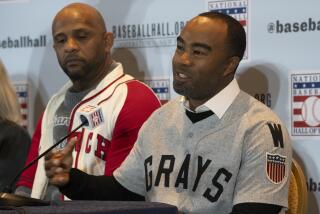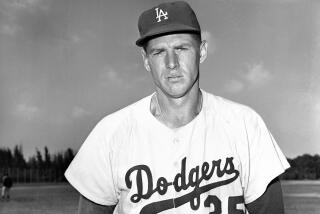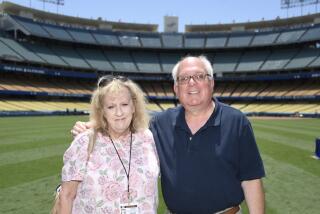Lester Rodney dies at 98; Daily Worker sports editor fought segregation in major league baseball
Lester Rodney, the sports editor and columnist for the American Communist Party newspaper the Daily Worker who crusaded to end segregation in major league baseball in the 1930s and ‘40s, has died. He was 98.
Rodney died of age-related causes Sunday at his home in a retirement community in Walnut Creek, Calif., said his daughter, Amy Rodney.
Beginning in the decade before Jackie Robinson suited up with the Brooklyn Dodgers and broke baseball’s color barrier in 1947, Rodney began pressing for the desegregation of baseball via columns and stories in the Daily Worker’s sports pages.
He called the ban against blacks in the major leagues “un-American” and “the crime of the big leagues.”
“None of the mainstream papers in the `30s made anything out of the fact that in the land of the free, midway through the 20th century, a great athlete with the wrong pigmentation of his skin couldn’t play in our national pastime,” Rodney said in a 2005 interview with the San Francisco Chronicle.
When a sports reporter asked Joe DiMaggio who was the best pitcher he had ever faced, the Yankee power hitter unhesitatingly responded by saying, “Satchel Paige.” (DiMaggio had faced the great Negro League pitcher in postseason exhibition games.)
While other newspapers ignored DiMaggio’s comment, Rodney ran a big headline over the story in the Daily Worker the next day: “Paige the Greatest I Have Faced -- DiMaggio.”
Rodney also reported Brooklyn Dodgers manager https:// Leo Durocher’s %20 admission to him that the Dodgers would sign black players “in a minute, if I got permission from the big shots.”
In his columns, Rodney pressured club owners and baseball commissioner Kenesaw Mountain Landis to end baseball’s color barrier.
Rodney and the Daily Worker’s campaign to induce the major leagues to integrate baseball included launching petition drives targeting baseball owners and executives and organizing informational picket lines at ballparks.
Through it all, Rodney, the communist, was shunned by some of his fellow sportswriters.
He also had to use pseudonyms to publish two baseball books for children in the early 1950s: “The First Book of Baseball,” under the name Benjamin Brewster; and “The Real Book About Baseball,” under the name Lyman Hopkins.
For decades, Rodney was considered little more than a historical footnote, a man whose efforts to help break the color ban in baseball was forgotten because he was a communist.
But that changed in 1997 when he was invited to speak at a national conference at Long Island University in Brooklyn celebrating the 50th anniversary of Robinson’s debut as a Dodger.
The same year saw the publication of “Jackie Robinson: A Biography,” by Arnold Rampersad, who wrote that “the most vigorous efforts [to integrate baseball] came from the Communist press . . . an unrelenting pressure for about 10 years in the Daily Worker, notably from Lester Rodney.”
Rodney went on to be invited to speak at baseball symposiums and was frequently interviewed.
He also was the subject of a 2003 biography by Irwin Silber: “Press Box Red: The Story of Lester Rodney, the Communist Who Helped Break the Color Line in American Sports.”
In 2005, Rodney was inducted into the Shrine of the Eternals by the Baseball Reliquary, a nonprofit educational organization in Pasadena.
Rodney “was a very early voice in the American journalistic community to talk on a regular basis for the need for major league baseball to integrate and include African Americans playing side by side with Caucasian players,” Terry Cannon, the organization’s founder, told The Times this week.
“This was not something that the regular newspapers in America were delving into,” Cannon said. “He was very much a pioneer in this respect.”
Born in Manhattan on April 17, 1911, Rodney lived in the Bronx until he was 6 and his family moved to Brooklyn, where he became a die-hard Dodgers fan.
He covered sports for his high school newspaper and earned a partial athletic scholarship to Syracuse University. But he had to turn it down and go to work after his father lost his silk factory and the family home in the wake of the 1929 stock market crash.
Rodney took night courses at New York University while working various jobs, including as a lifeguard, clerk and chauffeur.
In 1936, he wrote a letter to the New York City-based Daily Worker that was critical of its sports coverage. An invitation to air his views with the editor led to an offer to write for the paper on a trial basis. Six months later, he was made sports editor.
In joining the paper, Rodney also joined the Communist Party.
“When you were at NYU in the 1930s -- at any of the New York schools -- if you didn’t have serious questions about the workings of capitalism, you were sort of brain-dead,” he said in the 2005 Chronicle interview.
During World War II, Rodney served as an Army combat medic in the Pacific theater. But he was back home in New York to cover Robinson’s debut as a Brooklyn Dodger on April 15, 1947.
“It’s hard this Opening Day to write straight baseball and not stop to mention the wonderful fact of Jackie Robinson,” Rodney wrote. “You tell yourself it shouldn’t be especially wonderful in America, no more wonderful, for instance, than Negro soldiers being with us on the way overseas through submarine-infested waters in 1943.”
Rodney, who covered all sports during his career, including the historic 1938 Joe Louis-Max Schmeling fight, later pressed other ball clubs to integrate.
He quit the Daily Worker and the Communist Party in 1958 -- reportedly joining other editors in quitting when details of the late Soviet leader Josef Stalin’s human rights abuses became known and the party refused to report and debate the issue in the paper -- and moved with his family to California.
After stints at the Santa Monica Evening Outlook and a Beverly Hills advertising company, Rodney worked at the Long Beach Press-Telegram, where he served as religion editor. He retired in 1974.
Rodney’s wife of 58 years, Clare, died in 2004.
In addition to his daughter, Amy, he is survived by a son, Ray; a granddaughter; and his companion, Mary Harvey.
A memorial service is pending.
More to Read
Start your day right
Sign up for Essential California for the L.A. Times biggest news, features and recommendations in your inbox six days a week.
You may occasionally receive promotional content from the Los Angeles Times.






